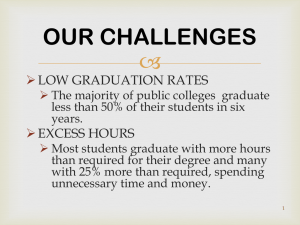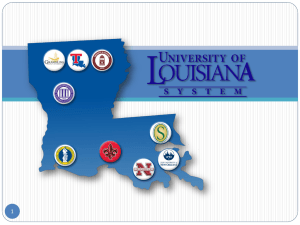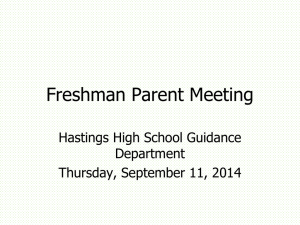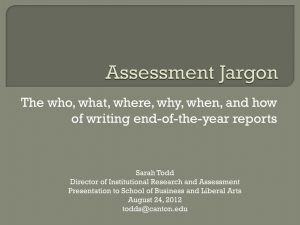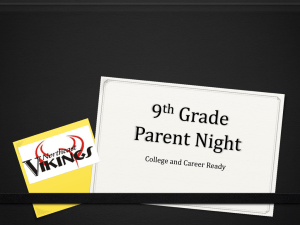Post Graduation Plans Questionnaire
advertisement
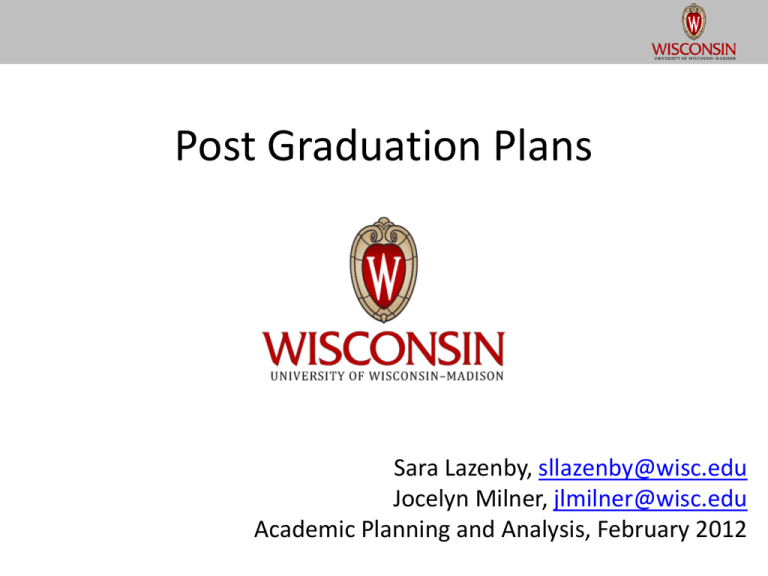
Post Graduation Plans Sara Lazenby, sllazenby@wisc.edu Jocelyn Milner, jlmilner@wisc.edu Academic Planning and Analysis, February 2012 Post Graduation Plans What is the Post Graduation Plans Questionnaire? • Started in 2008-09 (with December 2008 graduates). The survey has evolved since that point. • Meets VSA/College Portrait reporting requirements and potentially meets federal reporting requirements. • An e-mail request is sent near the end of the fall or spring semester to students who intend to graduate. • Survey is available via a portlet in the MyUW portal. • Asks questions regarding future plans and a self-assessment of learning outcomes. • Results tabulated after degrees are posted (October), responses may be matched to degree recipients. • Summary reports available by late fall. Special reports are available by request. Data is also available through the Data Warehouse/InfoAccess. Post Graduation Plans – Campus Summary Fall 2010 and Spring 2011 Bachelor’s Degree Recipients What is most likely to be your principal activity/activities after graduation? (Unduplicated) Work Full-Time Work Part-Time Considering one or more offers 7% 28% Other includes: graduate school part-time, additional coursework, military service, volunteering, and unspecified activities. Based on 1,810 responses (31% response rate) Do you have a valid passport? Yes, from the United States 80% Will begin searching for a position after graduation 6% 27% 12% Do you plan to work in Wisconsin after graduation? Yes 5% Undecided No 55% Currently searching for a position 6% Yes, from another country Have accepted a position 59% Graduate School Full-Time Other If employment selected, which best describes your plans at this time? 45% 15% 16% No Based on 1,723 responses (30% response rate) SL, Academic Planning and Analysis, 8/11 Source: Post Graduation Plans Questionnaire Responses) 39% Based on 1099 responses (92% response rate among those with work as their primary activity) Post Graduation Plans – Essential Learning Outcomes Questions about learning • Eighteen questions that provide a selfassessment at graduation, that maps to the essential learning outcomes at UW-Madison. • Respondents asked to assess their ability upon entering UW-Madison and at graduation. • Results are tabulated as the non-null average for each question • Added December 2010 Post Graduation Plans – Essential Learning Outcomes Post Graduation Plans – Essential Learning Outcomes Post Graduation Plans – ALL GRADUATES “How able were/are you to …” When Entering At Graduation Learn on your own Communicate in a language other than English Appreciate the arts such as literature, music, and fine arts Understand cultures and societies outside of the United States 5 4 3 2 Contribute to the welfare of others Apply skills and knowledge of your chosen major(s) Find, organize, and evaluate information from multiple sources Draw conclusions after weighing evidence, facts, and ideas Develop a personal code of ethics and values 1 Empathize w/ind. differences based on culture, ethnicity, disability or sexual orientation Understand culture and society within the United States Speak Effectively Write Effectively Apply knowledge and skills in real world settings Work collaboratively in groups Use computers and electronic technology Lead others effectively Understand that science is relevant to everyday life SL, Academic Planning and Analysis, 8/11 Scale: 1 –Not at all, 2 –A little, 3 –Somewhat, 4 –Very, 5 –Extremely Responses sorted clockwise from the question with the highest response score at graduation for all UW-Madison students. Based on 2,077 to 2,115 responses, depending on question. Majors with at least 50 responses to question about plans after graduation • • • • • • • • • • • • SL, Academic Planning and Analysis, 8/11 Biology Business: Finance, Investment, and Banking Economics English History International Studies Journalism Mechanical Engineering Nursing Political Science Psychology Spanish Post Graduation Plans – BIOLOGY MAJORS Fall 2010 and Spring 2011 Bachelor’s Degree Recipients What is most likely to be your principal activity/activities after graduation? (Unduplicated) Work Full-Time Work Part-Time Considering one or more offers 4% 55% Other includes: graduate school part-time, additional coursework, military service, volunteering, and unspecified activities. Based on 112 responses (29% response rate) “Do you have a valid passport?” Yes, from the United States 82% 6% Will begin searching for a position after graduation 8% 33% 17% Do you plan to work in Wisconsin after graduation? Yes Undecided No 42% Currently searching for a position 8% Yes, from another country Have accepted a position 32% Graduate School Full-Time Other If employment selected, which best describes your plans at this time? 64% 17% 11% Based on 108 responses (28% response rate) SL, Academic Planning and Analysis, 8/11 Source: Post Graduation Plans Questionnaire Responses) No 19% Based on 36 responses (88% response rate among those with work as their primary activity) Post Graduation Plans – ENGLISH MAJORS Fall 2010 and Spring 2011 Bachelor’s Degree Recipients What is most likely to be your principal activity/activities after graduation? (Unduplicated) Work Full-Time Have accepted a position Considering one or more offers 12% Graduate School Full-Time 33% Other includes: graduate school part-time, additional coursework, military service, volunteering, and unspecified activities. Based on 69 responses (31% response rate) “Do you have a valid passport?” Yes, from the United States 84% Yes, from another country 0% 6% Currently searching for a position 9% Will begin searching for a position after graduation 29% 21% Do you plan to work in Wisconsin after graduation? Yes Undecided No 44% 46% Work Part-Time Other If employment selected, which best describes your plans at this time? 43% 31% 16% Based on 67 responses (30% response rate) SL, Academic Planning and Analysis, 8/11 Source: Post Graduation Plans Questionnaire Responses) No 26% Based on 35 responses (88% response rate among those with work as their primary activity) Post Graduation Plans – BIOLOGY MAJORS “How able were/are you to …” When Entering At Graduation Learn on your own Communicate in a language other than English Appreciate the arts such as literature, music, and fine arts Understand cultures and societies outside of the United States 5 4 3 2 Contribute to the welfare of others Apply skills and knowledge of your chosen major(s) Find, organize, and evaluate information from multiple sources Draw conclusions after weighing evidence, facts, and ideas Develop a personal code of ethics and values 1 Empathize w/ind. differences based on culture, ethnicity, disability or sexual orientation Understand culture and society within the United States Speak Effectively Write Effectively Apply knowledge and skills in real world settings Work collaboratively in groups Use computers and electronic technology Lead others effectively Understand that science is relevant to everyday life SL, Academic Planning and Analysis, 8/11 Scale: 1 –Not at all, 2 –A little, 3 –Somewhat, 4 –Very, 5 –Extremely Responses sorted clockwise from the question with the highest response score at graduation for all UW-Madison students. Based on 104 to 107 responses, depending on question. Post Graduation Plans – ENGLISH MAJORS “How able were/are you to …” When Entering At Graduation Learn on your own Communicate in a language other than English Appreciate the arts such as literature, music, and fine arts Understand cultures and societies outside of the United States 5 4 3 2 Contribute to the welfare of others Apply skills and knowledge of your chosen major(s) Find, organize, and evaluate information from multiple sources Draw conclusions after weighing evidence, facts, and ideas Develop a personal code of ethics and values 1 Empathize w/ind. differences based on culture, ethnicity, disability or sexual orientation Understand culture and society within the United States Speak Effectively Write Effectively Apply knowledge and skills in real world settings Work collaboratively in groups Use computers and electronic technology Lead others effectively Understand that science is relevant to everyday life SL, Academic Planning and Analysis, 8/11 Scale: 1 –Not at all, 2 –A little, 3 –Somewhat, 4 –Very, 5 –Extremely Responses sorted clockwise from the question with the highest response score at graduation for all UW-Madison students. Based on 63 to 66 responses, depending on question. Post Graduation Plans – Targeted Minorities “How able were/are you to …” When Entering At Graduation Learn on your own Communicate in a language other than English Appreciate the arts such as literature, music, and fine arts 5 4 Understand cultures and societies outside of the United States 3 2 Contribute to the welfare of others Apply skills and knowledge of your chosen major(s) Find, organize, and evaluate information from multiple sources Draw conclusions after weighing evidence, facts, and ideas Develop a personal code of ethics and values 1 Empathize w/ind. differences based on culture, ethnicity, disability or sexual orientation Understand culture and society within the United States Speak Effectively Write Effectively Apply knowledge and skills in real world settings Work collaboratively in groups Use computers and electronic technology Understand that science is relevant to everyday life Lead others effectively SL, Academic Planning and Analysis, 2/12 Scale: 1 –Not at all, 2 –A little, 3 –Somewhat, 4 –Very, 5 –Extremely Responses sorted clockwise from the question with the highest response score at graduation for all UW-Madison students. Based on 106 to 116 responses, depending on question. Post Graduation Plans – Transfer-Starts “How able were/are you to …” When Entering At Graduation Learn on your own Communicate in a language other than English Appreciate the arts such as literature, music, and fine arts 5 4 Understand cultures and societies outside of the United States 3 2 Contribute to the welfare of others Apply skills and knowledge of your chosen major(s) Find, organize, and evaluate information from multiple sources Draw conclusions after weighing evidence, facts, and ideas Develop a personal code of ethics and values 1 Empathize w/ind. differences based on culture, ethnicity, disability or sexual orientation Understand culture and society within the United States Speak Effectively Write Effectively Apply knowledge and skills in real world settings Work collaboratively in groups Use computers and electronic technology Understand that science is relevant to everyday life Lead others effectively SL, Academic Planning and Analysis, 2/12 Scale: 1 –Not at all, 2 –A little, 3 –Somewhat, 4 –Very, 5 –Extremely Responses sorted clockwise from the question with the highest response score at graduation for all UW-Madison students. Based on 377 to 388 responses, depending on question. Post Graduation Plans – at Graduation “How able were/are you to …” (Transfers and Freshmen Starts) Transfer Starts Freshmen Starts Learn on your own Communicate in a language other than English Appreciate the arts such as literature, music, and fine arts 5 4 Understand cultures and societies outside of the United States 3 2 Contribute to the welfare of others Apply skills and knowledge of your chosen major(s) Find, organize, and evaluate information from multiple sources Draw conclusions after weighing evidence, facts, and ideas Develop a personal code of ethics and values 1 Empathize w/ind. differences based on culture, ethnicity, disability or sexual orientation Understand culture and society within the United States Speak Effectively Write Effectively Apply knowledge and skills in real world settings Work collaboratively in groups Use computers and electronic technology Understand that science is relevant to everyday life Lead others effectively SL, Academic Planning and Analysis, 2/12 Scale: 1 –Not at all, 2 –A little, 3 –Somewhat, 4 –Very, 5 –Extremely Responses sorted clockwise from the question with the highest response score at graduation for all UW-Madison students. Based on 377 to 388 and 1699-1732 responses, depending on question.
